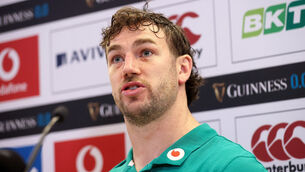'Toulouse were a powerhouse. We might as well have been Skerries or Greystones.'

Leinster captain Reggie Corrigan lies injured before being substituted during the Heineken Cup Pool 6 Round 6 match between Toulouse and Leinster at the Stade Les Sept Denier in Toulouse, France. Photo by Brendan Moran/Sportsfile
Mike Ruddock was still a player with Swansea and on a tour to the US in the ‘80s when he happened across an elderly lady who told him how she had migrated from the East Coast to California with her family as a toddler. The woman was 90 if she was a day so her trek westwards must have happened before the end of the 19th century.
The Wild West had long been tamed by then but her epic childhood journey from sea to shining sea still conjured up images of wagon trains, untamed prairies and all the potential dangers and majesties which generations of European settlers had encountered across the few hundred years since the first of the colonies were incorporated.












